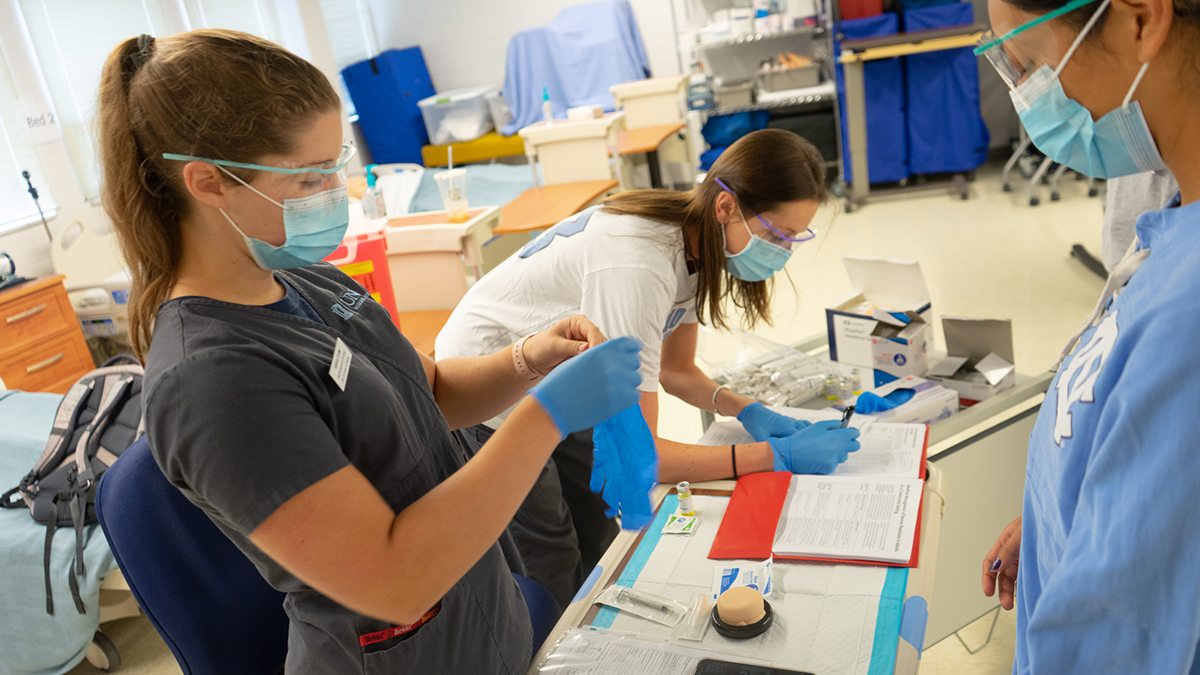Carolina Nursing students prepare for a future COVID-19 vaccine
Students at Carolina's School of Nursing conducted a mass immunization simulation to prepare the future nurses for a critical scenario they may be handling when a vaccine becomes available for the novel coronavirus.

Face masks, eye protection and scrubs. Undergraduate nursing students, a semester and a half away from becoming registered nurses, already looked the part.
Many of the students hadn’t seen each other in person since March since UNC School of Nursing courses are all virtual — other than simulation activities, or clinical hours spent in health care facilities around the Triangle.
But earlier this semester, Clinical Assistant Professor Susana Barroso and Clinical Instructor Erin Stanley set up a mass immunization simulation — exactly the kind of scenario nurses will be handling in the event of a coronavirus vaccine. For this exercise, they used the pharmaceutical details of a recent flu vaccine that the students based their decisions on.
The mock patients were given various patient profiles to act out, while the “nurses” took their place at one of five stations that were part of ensuring proper screening for illness, allergies and other health complications that could exempt someone from receiving the vaccine.
Some patients had a variety of possible COVID-19 symptoms: some were afraid of needles, some had a strange rash, and some were very concerned with the contents of the vaccine, possibly after reading misinformation on the internet or because they have an allergy. Each station had an important role to play, and the questions they asked were often redundant to make sure important details didn’t slip through the cracks.
Barroso made the task clear: “The goal of a point of dispensation focusing on mass immunization is to get as many people vaccinated while maintaining the health and integrity of everyone else”.
First, the patients filed into griage (greeting and triage) to answer preliminary questions from two student nurses. It immediately started getting hectic as several people were talking at once, and one patient was clearly irritable.
The nurses quickly realized that someone was needed to show patients where to go once it was determined they need further screening, and the task was assigned. This helps things run a bit smoother, but some of the patients are really testing their fellow students: “I just have a cough and a low fever. I want to get the vaccine and get out of here,” one insisted.
It became clear for the nursing students that this was not only an exercise to learn the processes, but to force students to handle potential tense situations while remaining calm, thinking on their feet and maintaining a strict adherence to protocol. When the patients and nurses switched places, the new nurses were already making adjustments based on the last run-through.
“We learned a lot watching the first group, like making sure intake is happening one at a time,” said student Abigail Sturm. Abigail navigated the entire exercise while holding her phone aloft so that a quarantined classmate could take part in the activity via Zoom.
The instructors ran this simulation twice every hour, for six hours, to accommodate the entire senior class — hurriedly resetting the stations before briefing the next group. This type of exercise has a new significance this year, and it’s vital these future nurses have this experience now.
“Simulation allows students to put theory into practice,” said Barroso. “They have an opportunity to connect content from different courses and care for ‘patients’ in a safe environment. The goal is to build muscle memory so that when they are confronted with a similar experience in the real world, they will have experience to draw from.”
This time next year, these students will be caring for their own patients. The symptoms will be real, the classrooms will be hospital rooms and this kind of exercise — along with mentored clinical hours— will be another boost in the knowledge and confidence it takes to provide safe, quality care.
As one student emphasized to another after a particularly difficult patient, “I’m glad we’re doing this before we really have to do it.”




